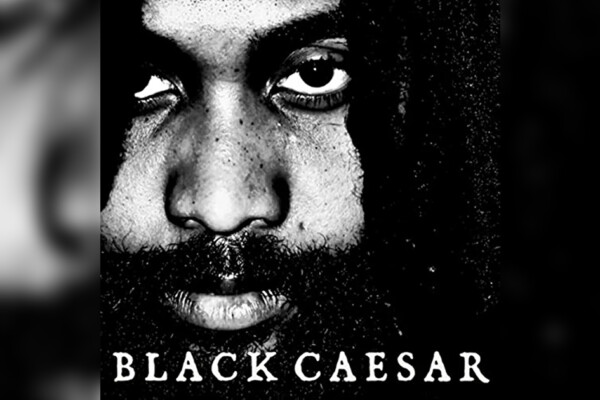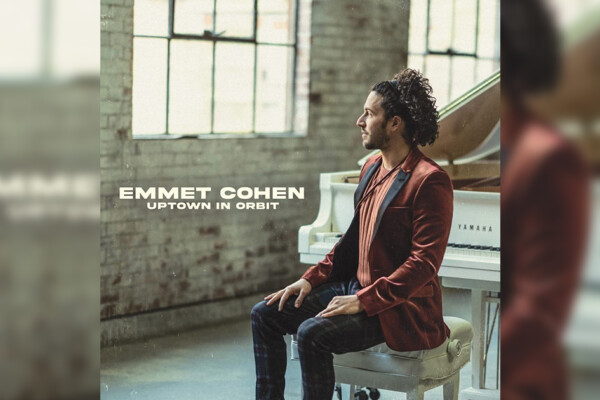Black Caesar: An Interview with Russell Hall
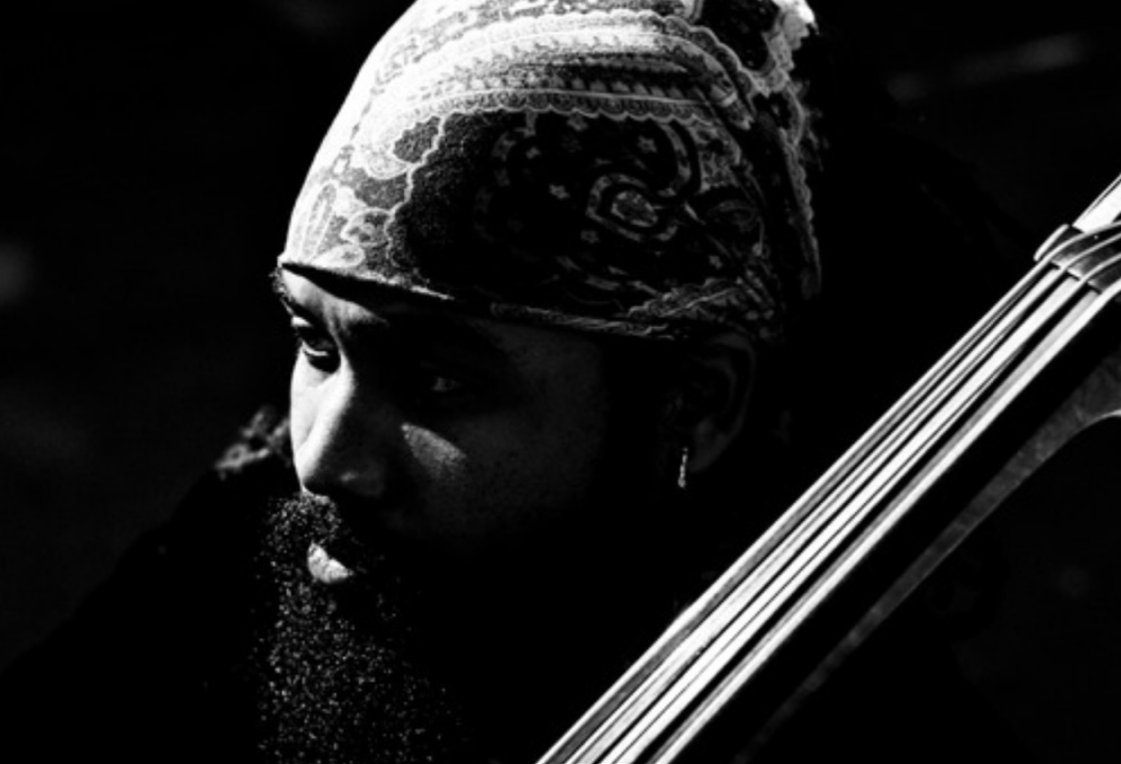
Although many know him for his astounding jazz playing, Russell Hall is a bassist that can’t be put into one category. Growing up in Jamaica, he was exposed to jazz, rock, R&B, reggae, and more. His grandfather was a gaucho, exposing him to classic country like Ernie Ford, Dolly Parton, and Willie Nelson.
“I got lucky. I grew up with a very eclectic and rich musical culture,” he tells us. “Then you seek stuff out on your own when you get older. Jazz came to me later.”
From his musical starts, he’s worked with who’s who of instrumental music, including Joey Alexander, Wayne Shorter, Wynton Marsalis, and more. His bass playing is visceral yet refined, with lines and melodies that cut to the essence of each song. (I’d be remiss not to mention his Discover Double Bass course where he teaches you his style.)
So it’s no wonder that his new album, Black Caesar, is a musical adventure in itself.
It begins with “Bessie’s Bop,” a hip-hop-influenced track featuring a Ron Carter-influenced bass line and aggressive spoken word. Hall leads his band through different dimensions with the hard bop of the ‘60s, modern jazz grooves, an R&B slow jam, and even a pirate’s jig. As disparate as that may sound, the album rolls neatly into a 56-minute aural adventure that feels like a cinematic experience.
When I caught up with Hall via Zoom, he had just wrapped up going down a musical YouTube rabbit hole of Diego el Cigala, Lenny Kravitz, and Hayden String Quartets while his parrot flew all around him. Our conversation got into Ron Carter’s influence, his writing style, and the concepts behind Black Caesar.
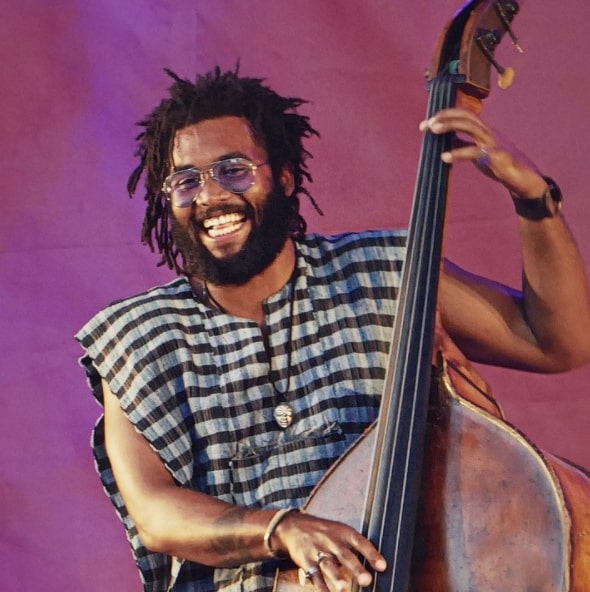
I was listening to your Discover Double Bass interview and you were talking about getting into Ron Carter early.
I’ll give you a funny story. I don’t know if you remember Limewire, but when I was fourteen or something I was playing electric bass only. I had to learn upright to join the school jazz band. I just typed in “jazz upright bass” and the first thing that came up said “jazz upright bass Ron Carter Footprints Wayne Shorter,” and all that stuff. I heard that bass line and thought, “this is crazy!” The other song I heard early was “Haitian Fight Song” by Charles Mingus. I grew up with a bunch of Haitians, so I thought, “Oh, I know about Haitians. I fought Haitians, too.” [laughs]
It’s funny now because fifteen years later and, I couldn’t be more of a composite of Ron Carter and Charles Mingus in the sense of my influences the fact that I’m an avid composer. In addition to that, they’re kind of opposites – like yin and yang. Ron Carter is this super bespoke gentleman and nothing is ever out of place. Then Mingus carries a shotgun and talks all kind of shit. Where I live is in the middle of that. I’m not too unhinged, but I’m not a perfect gentleman by any means.
To elaborate on Ron, I started falling in love with jazz. I saw that Ron Carter was playing in my hometown in Ft. Lauderdale. It was the first jazz concert I’d ever gone to. I have the deepest relationship with Ron Carter, Wynton Marsalis, and Branford Marsalis. They’re my three sages, but Ron in particular because we play the same instrument, and he was my bass teacher.
I’ve had a beautiful relationship with him over the years. When I went to Juilliard, the way I describe it is like Mr. Miyagi and the Karate Kid. He’s super stern with me and was always much harder on me than any other student – maybe ever. The things he said to me in masterclasses, oh my god. They would make a man want to cry. He was brutally honest. He’d make me play an A major scale for 20 minutes straight in a room of kids.
But that was always juxtaposed to unbelievable amounts of generosity. He saw that my bass was broken, and he said, “Listen, man, go to David Gage’s shop and tell them to put your bass on my bill. I’ll take care of it.” He’s paid to get my bass fixed, he’s given me strings, pickups… He’s just helped me throughout the years and given me this well of knowledge with a sense of minimalism in the music that’s uncanny.
I’d get pissed off sometimes when he was hard on me for different reasons, but now I look back, and it was exactly what I wanted to happen. It was amazing. Is Ron Carter beating up on me? That’s a level of love from somebody that’s done it before.
I have hours of tapes of lessons from Ron Carter. Hours and hours. The levels of where his mind goes are incredible. Even now, I’m a professional, but I went to his house and got some lessons. He’d say, “You need your 10,000 note check-up from me, man. Let’s hear this bass.”
It’s part of why I love music. It always humbles you. You’re always challenged, no matter what.
What’s one lesson from him that really stuck with you?
It was actually the last lesson I had. I hadn’t had a lesson from him in over two years. He said something that was so deep that really resonated with me now that I’m older. He said, “Don’t let your frustrations control the music.”
How many gigs have we been on where we let our life dictate the way that we play? Or the amount of time we a lot to practicing and learning? How often do we let life run the music instead of music run the life?
I’m less concerned with asking him what he played on “Pinnochio” or what to do on F-augmented chords. I want to know how to make the most authentic music through the most beautiful life. How do I make my life beautiful so my music can be beautiful?
So much has happened. Covid has changed perceptions of reality. Everything is virtual now. To hear from him about letting your life reflect your music and your music illustrate your life, that hit me.
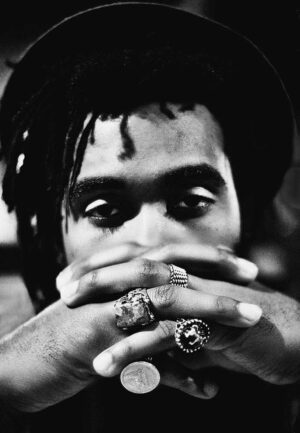
I went back and listened to The Feeling of Romance and then listened to Black Caesar. Now talking to you, it strikes me that the Carter/Mingus sound is between the two albums. “Romance” is elegant like Carter, whereas “Caesar” is raw and powerful like Mingus.
Feeling of Romance was focused more on composition, and I’m singing on it where I don’t on Black Caesar. I’ll be very candid. People thought I was going soft or something, just wanting to play pretty songs with flowers and shit. Black Caesar is in the spirit of Busta Rhymes and Mingus.
The original working title for it was “Nine Dudes Walk Into a Chinese Restaurant.” I wanted to create this pan-dimensional, interdimensional storyline where a bunch of dudes were hanging out and then ended up floating through dimensions. It was very influenced by Herbie Hancock’s Inventions and Dimensions, creating a world within a song. Then that song is connected to the other songs, but it’s a world upon itself.
The concept of the album is that you’re in a hallway with 14 doors you can open. Opening one door takes you to a dimension where you’re on a beach, then another puts you in the middle of a fight on the high seas, and the next one you end up in a temple trying to get a treasure. I tried to create that through the music.
“Black Caesar” was the first song I wrote for this album back in October 2020. I got inspired by all the protests. I started doing a lot of research on slavery and what black people in the Caribbean did during slavery. The choices were pretty much be a slave or be a pirate. There was a famous black pirate named Black Caesar. So I tried to make a storyline through the music without being so literal as in the first album.
I also wanted to feature the musicians more. Sometimes when you record, people get cut short because of time constraints and attention spans. So you’ll notice there are more songs on the album that are short. I wanted to showcase what I could do. Maybe down the line, I’ll make a standards album where I solo and all that sort of stuff, but that’s not really what I try to do so much.
The focus was to play the shit out of the bass and play songs that were easy enough for the musicians to understand and internalize while having their own individual quirks. Some of the songs have a 13-bar A section. I wanted the forms to be the challenge, not the meter or harmony. You’ll hear it on the tunes like “The Wildcarddd!” And “Queen Anne’s Revenge.”
You play with styles across the album so much that it has a timeless quality to it. You can hear some early jazz, plus the jig, which could be early, early, early jazz.
“Black Caesar” was the first song I wrote for this album back in October 2020. I got inspired by all the protests. I started doing a lot of research on slavery and what black people in the Caribbean did during slavery. The choices were pretty much be a slave or be a pirate. There was a famous black pirate named Black Caesar.
So I tried to make a storyline through the music without being so literal as in the first album.
You play with genres and styles so much across the album that it has a timeless sort of feel to it. You have everything from early jazz to a jig, which might be early, early, early jazz.
I wrote that for my parrot. “Oovoo’s Jig” is kind of like “Bushel and a Peck” or some early song like that. You’ll notice a lot of the tunes, in particular, “A Touch of Destiny,” and “The Wildcarddd!” And “Queen Anne’s Revenge” all have a similar theme. The harmony of the bridges are similar, and that’s just straight-up Dizzy Gillespie. It’s basically me taking “Woody’n You” and putting it in different flavors.
Do you write from the piano?
Most of it I wrote from the piano, but I wrote “Oovoo’s Jig,” “Bessie’s Bop,” and “Debbie’s Bounce” from the bass. You can hear it – it sounds like something a bass player would play.
The first track is so intense, like a smack in the face. Did you just want to wake people up with that?
It’s funny. That’s not my voice. There’s a guy we started hanging with in Harlem. It was a normal day and I was just planning on doing a quintet album. Then I just started hitting people up, so I hit up this guy Justin and told him I’d throw him some bones to freestyle over some stuff. I started playing this line that’s very influenced by Ron Carter, and he just started screaming at the top of his lungs. I was like, “Oh my god, we have to keep this.” We were all getting pumped up.
I also wanted to create this record to be a bridge. There’s so much division in the jazz world. There are the hip-hop cats, there’s the Jazz at Lincoln Center cats, there are the trad cats, there are the bebop cats. I play bass with all of them. I have no choice – I want to eat, I want to learn, I want to play. I have to play “Wolverine Blues,” then the next day play “Stakes Is High,” then the next day some crazy Wynton piece then I’m playing “Segment.” I wanted a record that did that all in a natural way, where I’m not “genre-bending.” I just thought, “Here’s a dope tune. Here’s another dope tune. Here’s another dope tune.”
You start to realize people get boxed in, and you’re forced to stay in one lane. But no – the road’s wide open, baby. I gotta give it up to Christian McBride for that, too. He’s somebody that plays with everybody, he just wants to play music and have a good time. I’m the same way – I want to play with everybody, and I love all music. Why would I stop that?
You have a unique voice on the instrument, too.
I’m playing gut strings on there. I gotta give a shout-out to Ben Wolfe, who is my biggest mentor in life and one of my best friends. He inspired me to love that sound and the challenges of playing gut strings. I’ve been playing them for about seven years consistently. You hear it on “Oovoo’s Jig,” I’m bowing gut strings. It’s not gonna pop out like if you’re playing Evah Pirazzi’s or something. You have to work at it, but I love the sound – the scratchiness and hollow nature.
What’s up next for you?
Right now… I don’t know if it’s a departure from jazz, but I’m starting to do more rock and grunge. I’m also trying to develop as a singer, so I’m back in school studying the human voice and how it works.
I started doing these rock gigs. I have a really loud voice. I can thank genetics for that, but I was blowing out my voice because I’d be doing five shows over a couple of weeks, and I wouldn’t have anything left. An incredible singer named Kennedy told me something a few months back. She said as a singer, you’re a vessel. You can hide behind a lot of instruments, but you can’t hide behind a voice. It will show everybody how you feel and what you’re going through.
Then I started to interpret it differently because I realized it’s the way I play the bass, too. The bass is just another voice, an extension. So you have to be a vessel. It’s the same thing Ron Carter told me. Don’t let your frustrations interrupt the flow of the music. You have to find that zen while you live a human existence.
So I also have another album in the works. It’s going to be a lot of fun with some headbangers.


